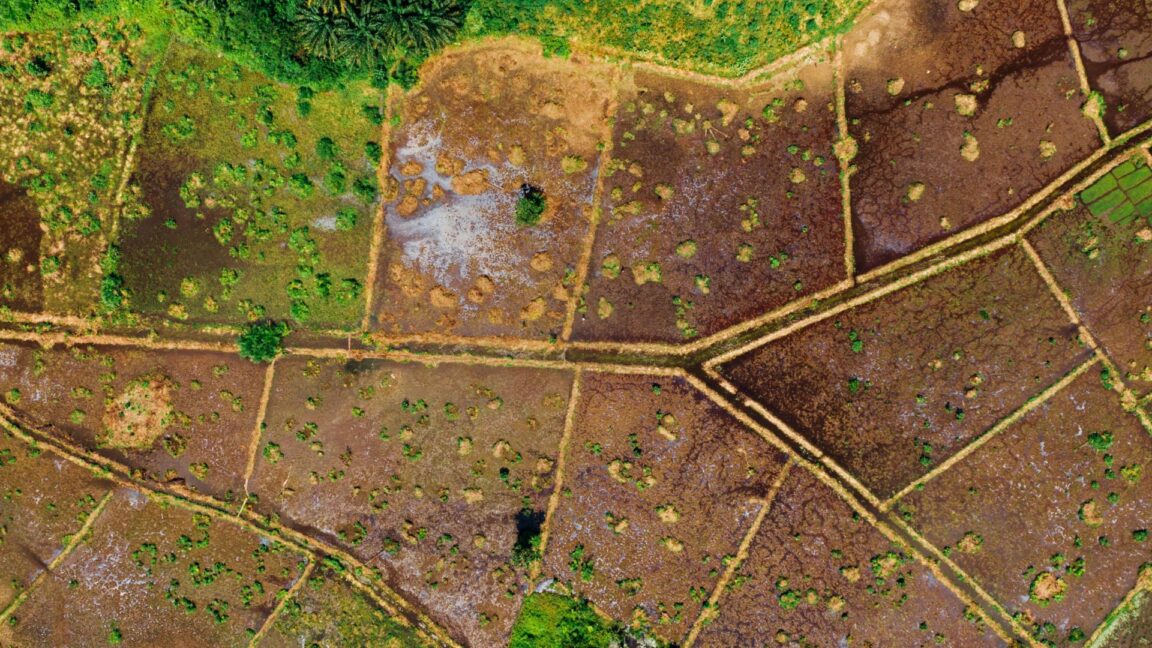In Short
Advice
Step into the world of Thailand’s history, where each plot of land tells a story that spans centuries. From Rai to Ngan and Wa, units of area measurement have seen the nation’s evolution. Join us as we uncover the units’ origins, its role in shaping Thailand, and its cultural importance. This blog post takes you to the heart of Thailand’s heritage. Let’s discover the history that shaped Thailand’s area measurement.
History of Thailand's Area Measurement

Thailand adopted the metric system on December 17th, 1923. A metric system is a measurement system that replaces the decimal system based on the meter.
Before metrication, Thailand used anthropic units for their traditional measurement system. Some of these are still in use. But, they follow the International System of Units (SI, Système International)/metric measurements. When the Royal Thai Survey Department conducted a cadastral survey in 1896, Director R.W. Giblin F.R.G.S. had this to say:
“”It so happens that 40 meters or 4,000 centimeters are equal to one sen,”.
Thus, surveyors plotted, drew, and printed all cadastral plans in a 1:4000 scale.
Rai, Square Wa, and Ngan are the three primary measurement units for area and space used in Thailand.

Rai
Rai (ไร่, pronounced [râi]) is a unit of area measurement in Thailand. 1 Rai is equal to 1,600 square meters in metric measurement. The current size derives from the meter unit, but isn’t part of nor recognized by the modern metric system , the International System (SI). Rai is 1 square sen (40m X 40m). Rai can also divide into four ngan or 400 square wa.
1 Rai = 4 ngan = 400 square wa = 1,600 square meters.
The word Rai in general also means farms.
Ngan
Ngan (งาน, pronounced [ŋāːn]) is a unit of area measurement in Thailand. 1 Ngan is equal to 400 square meters. The size derives from the meter unit, but isn’t part of nor recognized by the modern metric system , the International System (SI). Ngan is 1/4 rai, or 100 square wa, which is nearly 1/10 of an acre.
Ngan is also spelled as Ngaan due to different romanization of the Thai Language.
The word Ngan in general also means work.
Wa
Wa (วา, pronounced [wāː]) is a unit of area measurement in Thailand. 1 Wa is equal to 4 square meters. The 1833 Siamese-American Treaty stated:
“The Siamese fathom…being computed to contain 78 English or American inches, corresponding to 96 Siamese inches.”
Back then, the equivalent to wa would be a modern 1.981 meters. Following the 1923 metric system conversion, wa derived from two meters. But, the unit isn’t part of nor recognized by the modern metric system , the International System (SI).
Wa is also a colloquialism for Square Wa, the latter of which abbreviates as “ตร.ว.”. Wa abbreviates in Thai as “ว.”
Wa, due to different romanization of the Thai Language, is also spelled as Wah or Waa.
Wa, as a verb, is the act of outstretching one’s arms to both sides.
| Unit | Phonetics | Thai Spelling | Meaning Equivalent | Relative Equivalent | Metric Equivalent |
| Rai | [râj] | ไร่ | - | 4 ngan | 1,600 square meters |
| Tarang Wa | [tāː.rāːŋ wāː] | ตารางวา (ตร.ว.) | Square Wa | - | 4 square meters |
| Ngan | [ŋāːn] | งาน | 100 Square Wa | 400 square meters |
1 Rai is equal to 4 Ngan. 1 Ngan is 100 Square Wa. That means 1 Rai is equal to 400 Square Wa.
Basic Rai Equivalents to Common Western Measurement Units
1 Rai is equal to 1,600 square meters.
1 Rai is equal to 0.395369 Acres.
1 Rai is equal to 1913.5840740817 Yards.
Example Conversion: Rai to Square Wa
Let's say a plot of land measures 2 rai in size.
Multiply 2 by 400, which results in 800.
2 X 400 = 800 Square Wa
This means 2 rai is equal to 800 Square Wa.
*To convert 800 square wa to square meters, multiply 800 by 4 to get the square meter equivalent.
800 X 4 = 3,200 square meters
So, 800 square wa is equal to 3,200 square meters.
Example Conversion: Square Wa to Rai
Let's say you see a plot of land that measures 700 square wa in size.
In this case, do the reverse. Divide 700 by 400, which results in 1.75.
700 ÷ 400 = 1.75 rai
This means 700 square wa is equal to 1.75 rai.
*To convert 1.75 rai to square meters, multiply 1.75 by 1,600 to get the square meter equivalent.
1.75 X 1,600 = 2,800 square meters
So, 1.75 rai is equal to 2,800 square meters.
Example Conversion: Rai to Ngan
Let's say a plot of land measures 4 rai in size. 1 rai is equal to 4 ngan.
Multiply 4 by 4, which equals 16.
4 X 4 = 16 Ngan
This means 4 rai is equal to 4 ngan.
*To convert 4 ngan to square meters, multiply 4 by 400 to get the square meter equivalent.
4 X 400 = 1,600 square meters
So, 4 ngan is equal to 1,600 square meters.
Example Conversion: Ngan to Rai
Let's say you see a plot of land that measures 48 Ngan in size.
Do the reverse by dividing 48 by 4, which results in 12.
48 ÷ 4 = 12 Rai
This means 48 Ngan is equal to 12 Rai.
*To convert 12 rai to square meters, multiply 12 by 1,600 to get the square meter equivalent.
12 X 1,600 = 19,200 square meters
So, 12 rai is equal to 19,200 square meters.
The Formulas
Squares and Rectangles
The easiest way of calculating the area of a quadrilateral is when it's square or a rectangle with 90 degree angles. You can get the area using these two formulas.
Square area = Side X Side or Side Squared
Example
Assuming the land has a length of 20 'wa,' you would get 20 x 20 = 400 square 'wa.' The area of a rectangle = width x length.
Rectangle area = Width X Length
Example
Suppose the land has a width of 15 'wa' and a length of 20 'wa.' Then, you would get 15 x 20 = 300 square 'wa.'
Other Quadrilaterals
In reality, the shape of the area might not always make right angles at every corner. Sometimes it leans left, right, broader at the bottom, or tapers at the top. These variations can result in various types of quadrilaterals. So, you need to use formulas that involve the diagonals and both sides, as follows.
The area of any quadrilateral type 1 = 1/2 x (diagonal x sum of the branches)
Example
Assuming the land has a diagonal of 10 'wa' and each branch has a length of 4.8 'wa'. You would indeed get 1/2 x (10 x (4.8 + 4.8)) = 48 square 'wa.' This results in a rectangular area with a width of 6 'wa' and a length of 8 'wa,' which also equals 48 square 'wa.'
The 'branches' are the lines drawn from the corners to form right angles (90 degrees) with the diagonal. Split the quadrilateral into two triangles and calculate their combined area. But, in cases where there are all four sides of the quadrilateral, you'd need a more complex formula.
Triangles
To calculate the area of a triangle, you need to know the length of the base and the height from the base to the apex. Then, use this formula.
The area of any triangle = 1/2 x base x height
Example
Assuming the land has a base length of 16 'wa' and a height of 12 'wa,' you would indeed get 1/2 x (16 x 12) = 96 square 'wa.
Recommended Apps for Calculation and Conversions

For those wishing not to go through the calculation on their own, there are mobile applications to help you.
Ling
This app makes land measurement a breeze. It comes with the option of pinpointing survey markers on satellite maps within the app. It also provides GPS coordinates for each marker and easy data sharing with others.
Available on:
Land Survey Calculator
This app calculates area based on the selected shape of the land. It also allows you to convert the result into other units within the same app. But, the conversion is available only for international units.
Available on:
Rai Thai Area
This application calculates areas using numerical inputs and converts them into Thai units. It also features a unified measurement unit conversion system. This eliminates the need to specify the source and target units for conversion.
Available on:
Area Measurement Units Demystified!
Today, as we navigate landscapes and transactions, these units’ heritage remains intact. As we close the book on this exploration, remember that rai, ngan, and wa are more than a unit of measurement. It’s a story passed down through the generations.
If you’re looking to invest in or buy land, then you’re in the right place. Check out the links below or get in touch with us today!
FAQs
Lorem ipsum dolor sit amet, consectetur adipiscing elit. Suspendisse varius enim in eros elementum tristique.
Explore More Topics
Free real estate resources and tips on how to capitalise



